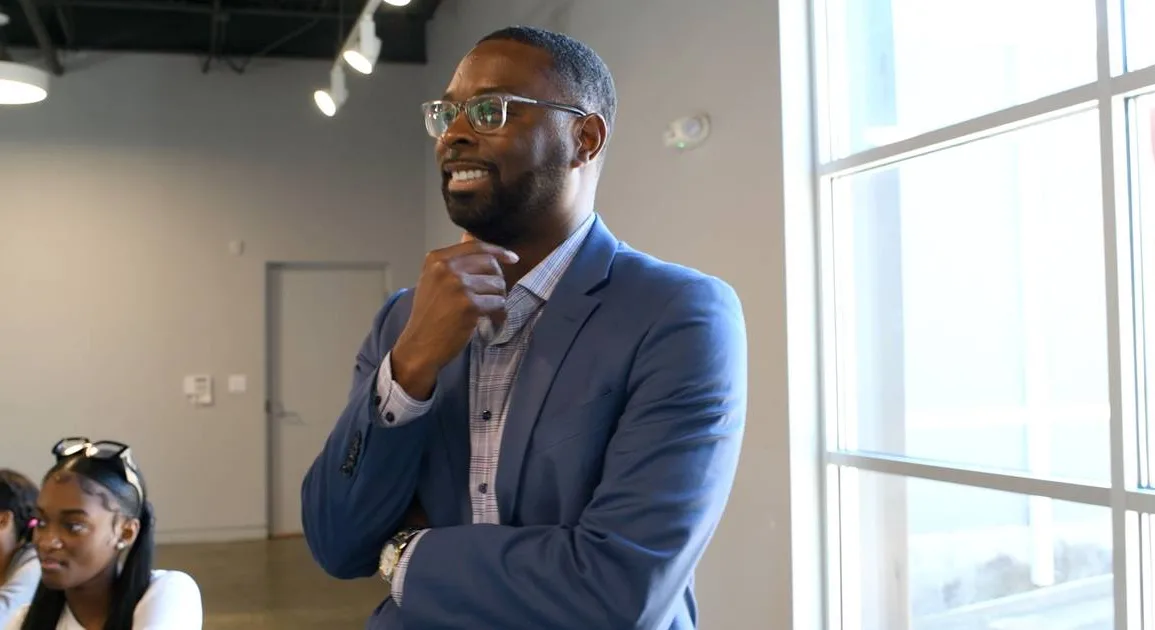The city of Memphis is one the most culturally rich places across the nation. Known as the birthplace of the Blues, Rock & Roll, and the soul music of Stax Records, “Grind City” has historically been an oasis for African Americans, making Memphis the nation’s largest majority-Black city with a population of 621,056.
Although Memphis is filled with opportunities, the city has its own unique set of challenges. In 2022, Memphis led the nation in the number of children who live in poverty. Also, the city has seen a rise in crimes across the board. It was also cast into infamy when a group of policemen fatally beat 29-year-old FedEx worker Tyre Nichols in January. The officers, now terminated, are expected to stand trial in May 2024.
To address the city’s issues and its possibilities, Mayor-Elect Paul Young was elected as its next executive leader on October 5, defeating as many as 17 candidates. Before his election, Young, 44, served as President/CEO of the Downtown Memphis Commission and was the former Director of Memphis Housing & Community Development, bridging wealth experience to his position.
As he prepares to assume office in January 2024, Young has an audacious vision to make Memphis the new “Black Metropolis” of the country as he ushers in a new era of leadership for the city.
BET.com spoke with Young about what led him to the world of politics, the challenges the city has to face, and why Memphis will be the Black destination city of the future.
BET.com: Of all the ways you could have chosen to impact Memphis, why did you choose to enter politics?
Mayor-Elect Paul Young: I went to graduate school to get a Master’s in City Planning solely to figure out how to rebuild neighborhoods and communities in the city. My background is in electrical engineering. My dream job was to be the Director of Housing for Memphis and God saw fit that it happened in 2016.
I got an opportunity to do some amazing work and what I saw when I was in that role is that if I really want to have the impact that I want to have on the people in our city, the mayor’s office is the best way to do it. The path cleared for an opportunity last year, and I just jumped in, I stepped out on faith and did it.
BET.com: Your parents, Bishop William and Pastor Dianne Young are well-known religious leaders in Memphis. How has their example informed your perspective as a leader?
Young: I think it helped to mold me and gave me the empathy to understand the experiences that people go through. Because when you’re the son of a preacher, all of the church’s problems come into your household. It also taught me to see the pain and hurt that people are carrying and try to get them through those issues. It gave me faith, determination, and a heart for service. When they started throwing mud and saying things that weren’t true about me on the campaign trail, it was my faith that said, “You’re on a mission.”The mission is to unify our city and bring us together.
BET.com: Throughout the primary season, you had to go against 16 other candidates. How was that process?
Mayor-Elect Paul Young: I think we had so many candidates because, for the first time in 51 years, there was no incumbent because term limits just kicked in. I’ve never run for office before but I’ve worked in local government. So what we did was we made it a people-building campaign. I intentionally didn’t focus on getting close to politicians and I focused on community leaders and people in neighborhoods. We had this strategy where we would have one person host a house event where I would come in and share my vision with 15-20 people in attendance. We just kept leapfrogging all throughout our city and community. We built this grassroots coalition of support before the campaign even really kicked up in the summertime.
BET.com: As head of the Downtown Memphis Commission, what lessons did you learn from that position that you will bring to the mayor’s office?
Young: I’ve been the Downtown Memphis Commission president for two and a half years and what I’ve learned is downtown is essentially a small version of our city. So all of the challenges that our city has, our downtown has. If you want to act up, they come downtown, and if they want to hang out and have a good time, they come downtown.
So in terms of issues around public safety, I have a lot of experience working with community members, the police Department, and other stakeholders to try and keep things safe. It’s also the ability to work with all of the different business owners, residents, constituents, and constituents’ services that I’m learning, just by virtue of being in this role.
BET.com: What are some of the challenges that Memphis has that you want to keep key in on that first week of January?
Young: Crime is number one. I understand that there’s a root cause when we talk about crime. In short, we’re gonna address root causes with a two-fold approach. One, we’re going to hold people accountable. There will be no tolerance because they are making it hard for people who are trying to do the right thing. The second and equally important part is that we’re gonna focus on intervention and prevention. We’re gonna use data to identify who we know is already getting suspended from school and truancy court. We’re going to target interventions, not in a punitive sense, but in an opportunistic sense. We’re going to find programs in their zip code that can help change their lives so that they don’t have to be held accountable for something they do wrong later.
What most people don’t understand is that the mayor does not control all of these facets of criminal justice. All we control is the Memphis Police Department. We can get you off the streets but once they go into the criminal justice system, it’s up to the district attorneys, the judges, the public defenders, and all these other players. So I want to be the chief convener who brings all of them to the table so that we have a cohesive effort around how to tackle our biggest challenge, which is, which is crime.
BET.com: One incident that took place in Memphis and drew national attention was the killing of Tyre Nichols while in police custody. How do you plan to address the need for police accountability in the Memphis Police Department?
Young: Unfortunately, the Tyre Nichols incident took place in Memphis but it could have taken place in any city in the country. What was on display in that incident is a part of the subculture that exists within law enforcement. We know that it’s not all officers and I wouldn’t even say it’s the predominant, but it exists. We want to use that as an opportunity to make sure that we get it right and that we make sure the practices of officers are reevaluated. We want to make sure that we have proper supervision and proper monitoring for officers. Training is important but I always remind people that those officers who were involved in the incident were trained. They knew exactly what they were doing was wrong. We want to make sure there are limited opportunities for that behavior.
My goal for Memphis is to be the model on how to get a right with police and our residents. We were a model of how to respond to a crisis with transparency like what was shown at that moment by how quickly charges were brought. It hadn’t happened before in this country. We want to be the model so we won’t see those practices in the future.
BET.com: After a few years of leading the city, what would a successful Young administration in Memphis look like?
Young: I’ve said many times before that I want to be judged on the progress we make as a city. I’m not coming in naive to believe that we’re gonna eradicate poverty in three years but you should see indications of progress. You should see the numbers moving in the right direction. You should see more, more people walking around our streets and more vibrancy in our community. Those are just some of the things that you are going to see as a part of our administration.



